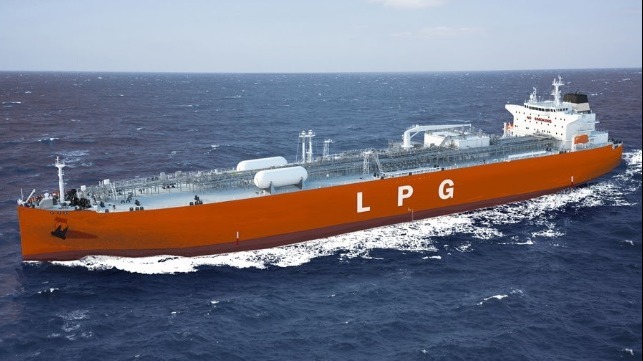World’s Largest Very Large Gas Carriers (VLGCS) Ordered in China

Sinogas, the Singapore-based gas shipowner, has placed a firm order for two of the 93,000 cbm VLGCs, with options for three more vessels. On delivery, these ships will be the largest VLGCs in the world and they will be powered by liquefied petroleum gas. According to the Jiangnan Shipyard, part of state-owned CSSC Group, the new vessels mark a further technological advancement in the development of gas carrier concepts in collaboration with Bureau Veritas.
The design is an evolution of Jiangnan’s “Panda” Series of VLGCs, with an optimized hull-form to allow increased cargo capacity without significant increases in fuel consumption and creating further economies of scale. The design incorporates two deck-mounted LPG fuel tanks, enabling LPG-fueled operations when carrying non-LPG cargo. Delivery of the gas carriers, which will primarily transport LPG, is scheduled for the first half of 2023.
Jiangnan Shipyard has completed a significant number of projects in cooperation with BV during the last two decades – most notably for gas carriers. The Sinogas order is a significant milestone for both the shipyard and class society on the journey to a decarbonized industry. Once in operation, the new design will reduce CO2 emissions by approximately 32% in comparison with the previous generation of 84,000 cbm VLGCs powered by low-sulfur fuel oil. Hu Keyi, Jiangnan Shipyard’s Chief of Corporate Technology, said that he believes gas as fuel will be a reliable pathway to bridge the emission gap.
“Jiangnan aims to be on the cutting-edge of technological development in this field by pushing for “initiative green” solutions, as opposed to “passive green” based on existing technology.” Hu further explained that “Through a revolutionary structural configuration, Jiangnan has been able to enhance cargo capacity within traditional “Houston Ship Channel” dimensions without significantly increasing fuel consumption”, Hu said.

that matters most
Get the latest maritime news delivered to your inbox daily.
Jiangnan's team used computational fluid dynamics (CFD) for hull line optimization. Jiangnan also adopted smart shipbuilding techniques with the use of digital technology, 3D digital mock-ups, 3D model submission and production planning, construction simulation, and lifecycle management.
Alex Gregg-Smith, Senior Vice President & Chief Executive, North Asia & China, at Bureau Veritas Marine & Offshore said: “Bureau Veritas has had many successful projects with Jiangnan Shipyard, especially in gas carrier segment, during the past decades. This new generation of VLGCs establishes a significant milestone towards decarbonization.”
